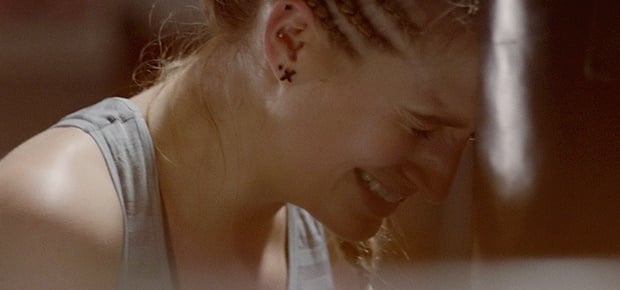
WHAT IT'S ABOUT:
Actress, director, and screenwriter Nicola Hanekom’s first feature film weaves an unsettling story that is geographically set in Cape Town, but as pertinent, and as necessary anywhere in the world. Although filming finished before the #MeToo movement gained the momentum that now feeds its forceful, justice-driven nature, the unfortunate familiarity of the story guarantees its place in the movement – specifically as it illuminates the trauma of date-rape. Hanekom’s film, an adaption of her stage play of the same name, centers around two young tennis players whose chances of making it to the top in the tennis world shrink with every injury and every birthday. First the one, then the other start to bend the rules. But what began as an ill-fated decision to remain relevant and competitive tennis players, quickly spins out of control.
WHAT WE THOUGHT:
In a post-screening Q&A session with Hanekom, her husband and film partner, Grant Swanby, and two of the lead actresses, Keziah Gabriel and Chloe Papademetriou, the director shares a telling piece of feedback she received from some male colleagues about the film.
The feedback, which can only be vaguely described here, lest the film’s many spirals be spoiled, boils down to the fundamental differences of perception men and women have about women, and especially how they act and dress in social spaces. How Hanekom’s colleagues perceived a scene with two of the female characters and the two central male characters directly clashed with her own. While the women in this scene show a clear lack of interest in the two men, Hanekom’s male filmmaker friends disagreed. Of course, the women were flirting! Of course, they wanted to go home with these guys!
(Let it be known and shouted from the rooftops, that even if they were flirting or dressed provocatively, danced with them or kissed them or whatever else it is always sexual assault if there is no active consent.)
This little piece of feedback that Hanekom received, serves as a chilling reminder of the constant perils of, well, being a woman, and underscores exactly why Cut-Out Girls is a vital piece of art.
Putting its essential nature aside, the film is also an exceptional example of a story – shared by millions of women and men globally – that is best told without graphic violent images. In this Hanekom succeeds by implying the violence, although it does not make the gut-punches any less relentless.
Perhaps it is so much more powerful to shelve the explicit visual detail because most of us can imagine exactly what does happen in these scenes. Maybe even imagine a little too well. For many people, these violations are ingrained as memories or as scars on their bodies or as searing trauma that never leaves. This method of storytelling would, of course, not have worked so well had it not been for a cast that inhabits their characters with lucid intensity. In the case of the two central male figures, portrayed by Joel Rosenblatt and Cody Mountain, their credibility can be disconcerting at times.
Hanekom wisely keeps away from tropes that could have turned Cut-Out Girls into an “everything is going to be okay” narrative. By avoiding it the film acknowledges victimhood as well as the spirit of survival. It is a hard balance to find, and Hanekom should be applauded for finding it in only – unbelievably – her first feature film.
The film’s journey spans over two years, and to keep true to the meaningfulness the team had envisioned, filming was funded through crowdfunding. Only after shooting finished, did they reach out to investors that helped to push Cut-Out Girls over the finish line. The next step is to find a distributor. As Hanekom tells the audience: “My biggest fear is that it will end up on a hard drive shoved in the drawer of my bedside table.”
It should never end up in that drawer. Like the unheard voices that have been silenced far too long (and, incredulously, this silencing continues,) the film doesn’t just need a platform, it is owed one.
READ NEXT
WATCH: How Uyinene Mrwetyana’s murder ignited a movement a News24 documentary




 Publications
Publications
 Partners
Partners















